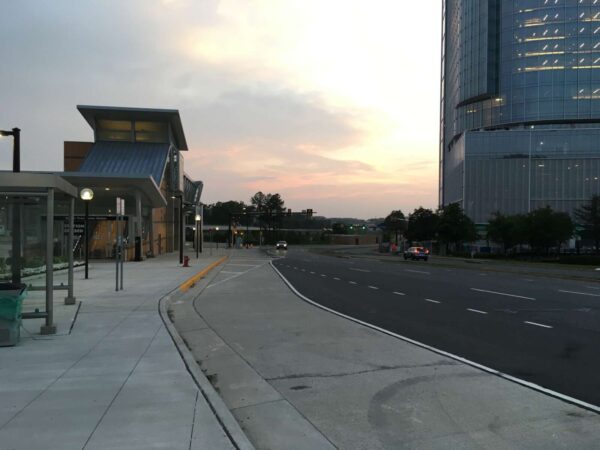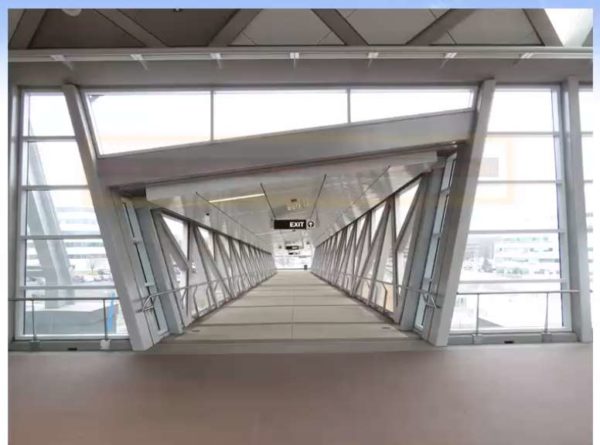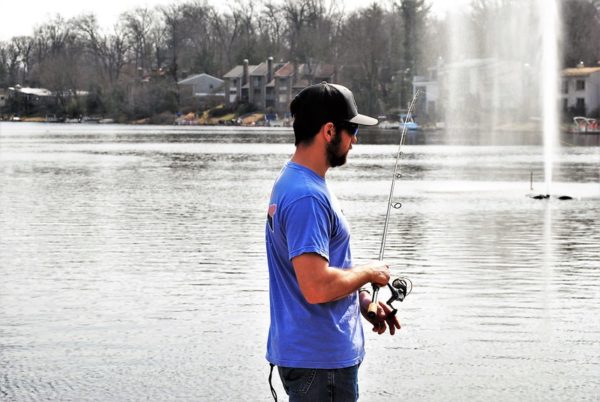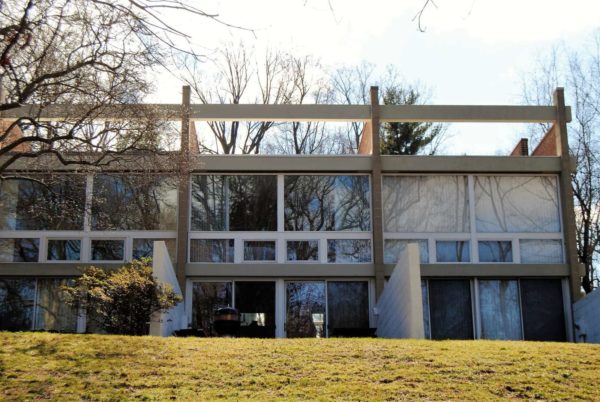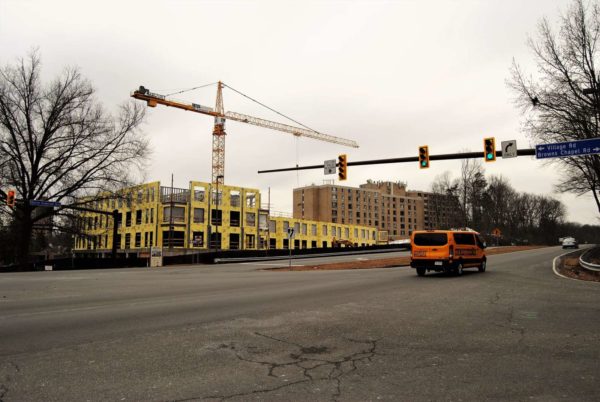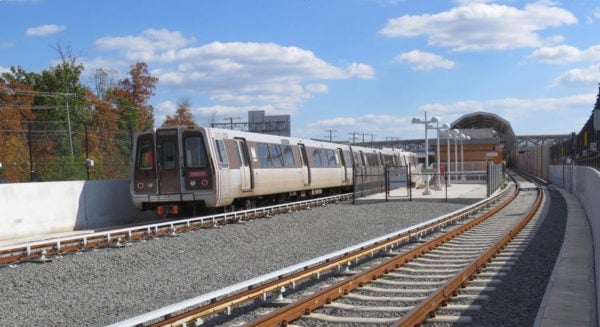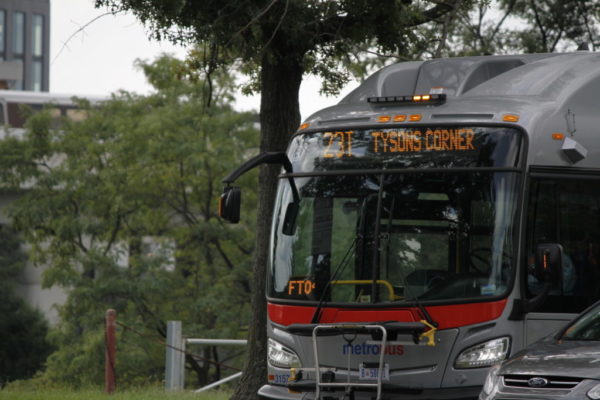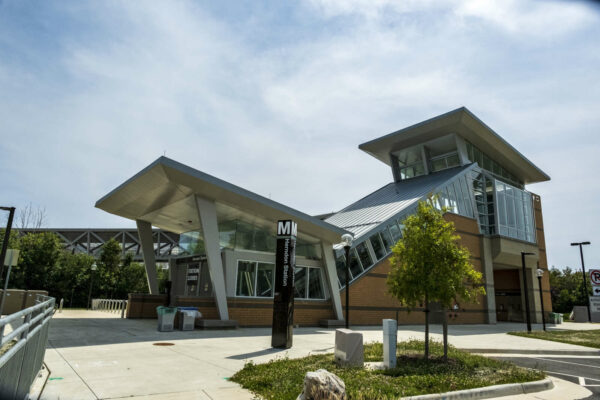
The Labor Day deadline for “substantial completion” of Silver Line Phase 2 won’t be met, Metro staff acknowledged at a Board of Directors safety and operations committee meeting today (Thursday).
The presentation confirmed what the Metropolitan Washington Airports Authority (MWAA) told Fairfax County earlier this month.
At this point, it remains unknown when the project will be substantially completed and able to be turned over to the Washington Metropolitan Area Transit Authority (WMATA). The expected delay will likely push the opening date even further back.
“There hasn’t been a new substantial completion day published [by MWAA],” said Andy Off, Metro’s vice president of project implementation and construction. “But we are confident it’s going to get moved past Labor Day.”
The latest delay of the $2.8 billion public transportation project stems from the need for more testing and work to tie Silver Line’s first and second phases together. That will require another shutdown of Wiehle-Reston East Metro station, much like the one that happened late last month.
“There are specific tests that were not completed over that weekend that necessitated a further shutdown,” Off said. “We are currently working with MWAA to schedule that.”
Reston Now reached out to MWAA about when that station shutdown will happen but has to hear back as of publication.
Off assured committee members that the delay has nothing to do with concrete issues or any other major safety concern.
“Right now, it’s really an IT project as it relates to our signal infrastructure,” Off said.
Once the Wiehle-Reston East outage gets scheduled and the work is completed, Off said there will be a better idea of a substantial completion date, with “fall” being as specific as he can get at this juncture.
Metro will need about six months from substantial completion to complete testing and “pre-revenue activities,” including trainings and further testing, which is contractually obligated to take no longer than 90 days, according to a presentation to Fairfax County Board of Supervisors transportation committee last month.
A Labor Day hand-off would have put Silver Line Phase 2 on track to open in the first quarter of 2022, but now, operations likely won’t begin until later that year. The project will extend Metro from Reston into Loudoun County with six new stations.
At the WMATA board committee meeting, officials emphasized that this delay is unrelated to any problem. There’s simply a need for more testing time.
“It’s not unusual to have several tests planned and just not have the amount of time as you need,” rail safety expert Devin Rouse, who’s on the Metro board, said. “If anything significant does come up, that’s a discussion we really need to have. At this point, this is normal for these types of projects.”
While officials have downplayed this particular delay, it follows a long line of Silver Line Phase 2 holdups that have frustrated residents and businesses waiting for the multi-billion-dollar public transporation project, which was initially set to open in 2018.
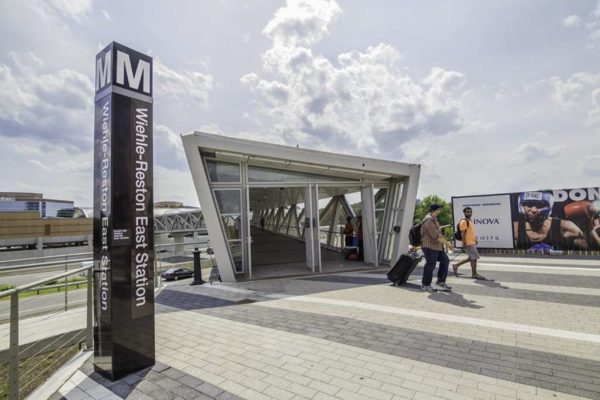
(Updated at 3:30 p.m.) The Wiehle-Reston East Metro station will be closed this weekend (June 25-26) so workers can connect the first and second phases of the Silver Line.
Most of the work being done this weekend is electrical and technological, as opposed to construction, says Marcia McAllister, spokesperson for the Metropolitan Washington Airports Authority.
“The work to be done this week by MWAA and CRC (our contractor) will make the permanent power connections between Phase 2 and the existing WMATA system,” wrote McAllister in an email to Reston Now. “This connection is at the Wiehle-Reston station which is the current end of the Silver Line.”
Additional testing will also be done this weekend.
Metro will provide free shuttle buses throughout the weekend to transport passengers between Wiehle-Reston East and the Spring Hill station in Tysons, the closest stop on the Silver Line, MWAA says.
The Washington Metropolitan Area Transit Authority has called the task of connecting the two phases of its Silver Line rail a major benchmark and potential challenge of the project.
McAllister noted that this closure is an expected part of the process as MWAA prepares to hand over the project to WMATA in September.
Another outage — meaning potential additional closures — will be needed prior to that fall turnover, writes McAllister, but a date for that has yet to be determined.
“At this time, this weekend’s shutdown at Wiehle-Reston East is the only closure scheduled during the next 8 weeks with regard to Silver Line Phase 2,” Metro spokesperson Sherri Ly told Reston Now.
Silver Line Phase 2 appears to be still on track to open in the first quarter of 2022, though officials previously cautioned that the timeline is subject to change.
The long-delayed $2.8 billion project originally had a completion date of 2018. But design changes, defective panels, contractor issues, flawed rail ties, and bad concrete all contributed to the nearly four-year delay, which has tested the patience of some local businesses in Herndon and Reston.
Getting to and from Metro stations can be a harrowing experience for pedestrians and cyclists, and the Fairfax County Planning Commission and others want something to be done about it.
The planning commissioners have called on the Fairfax County Board of Supervisors to require Metro, the state and county transportation departments, and more to “work immediately” to make safety and accessibility improvements for pedestrians and bicyclists to transit stations.
“This is a call for action by the public to improve pedestrian/bicycle access to metro stations as envisioned in the comprehensive plan,” Hunter Mill District Planning Commissioner John Carter said when introducing a motion during the commission’s meeting on May 19.
The measure calls for numerous changes, such as:
- Providing wide sidewalks at intersections within walking distance of transit stations,
- Making turns on roads tighter at intersections to slow traffic down,
- Providing a “double ramp” for people with disabilities instead of single ramp that’s currently in use directing pedestrians to the middle of intersections,
- Avoiding extra turning lanes at intersections with high volumes of pedestrians
- Providing closely spaced street trees between curb and sidewalk areas to protect pedestrians.
The motion passed, with 10 members voting for it and at-large member Timothy Sargeant, abstaining. Sargeant did not respond to a message seeking comment on why he voted that way.
“Failure to act will cause pedestrian access to continue to be ‘significantly challenged’ and ridership on the metro station to be reduced,” Carter said.
He introduced the motion during the commission’s discussion on whether to approve changes to the office-residential complex Reston Gateway being constructed, but he noted that the issues seen at Reston’s Metro stations could apply to other locations as well.
Supervisor Walter Alcorn, whose Hunter Mill District includes the Reston Gateway project, agrees that the main crosswalk serving the upcoming Silver Line station at Reston Town Center is not pedestrian-friendly.
“The rail project used cookie-cutter designs,” he said, adding that a walkway over the road has been proposed but could be years away from coming to fruition.
When touring the area a couple weeks ago, Alcorn asked the Fairfax County Department of Transportation to identify short-term improvements to occur before the station opens, which isn’t expected to happen until early 2022.
“I want to make sure riders can readily get to the stations on day one and every day thereafter,” he said.
Pedestrian and bicyclist advocacy groups expressed support for the commission’s call for change. Read More
(Updated, 4:20 p.m.) Metro’s Board of Directors is set to approve a $4.7 billion capital and operating budget on Thursday (April 22) that includes $723 million in federal relief.
The influx of federal funds essentially renders concerns about drastic service cuts set to come in January 2022 moot. Those cuts would have potentially included closing 22 Metro stations across the system, shutting down Metrorail every day at 9 p.m., and limiting train arrivals to every 30 minutes at most stations.
Among the stations that were being proposed to close in 2022 were three yet-to-be-opened Silver Line Phase II stations — Innovation Center, Loudoun Gateway, and Reston Town Center.
Metro officials are now assuring the public that this possibility has now been taken off the table.
“If the Board does adopt this budget, I think it’s an important message to the entire community that these cuts are not coming,” Washington Metropolitan Area Transit Authority General Manager Paul Wiedefeld said at Metro’s Finance and Capital Committee meeting on April 8.
Instead, as the proposed budget states, current Metro services will maintain at their current level for at least another full year.
If adopted, the budget will also officially push back the start of service on the second phase of the Silver Line until January 2022 at the earliest.
The budget notes that “substantial completion” of the line is expected by Labor Day weekend, when the Metropolitan Washington Airport Authority says it will be able to hand over the project to WMATA.
Last month, Hunter Mill District Supervisor Walter Alcorn told Reston Now that he was relieved federal relief will save Metro from making drastic service cuts.
“While the WMATA board is working to finalize the FY2022 budget, the Silver Line Phase 2 will now open whenever it is ready and because of the federal funds all Metrorail stations will stay open,” Alcorn said in a statement.
Delaying Silver Line Phase II from the July opening planned in WMATA’s fiscal year 2021 budget will also save Metro money. At a work session in February, operating costs for Silver Line Phase II were estimated to be about $120 million annually, or $10 million a month.
The delay will likely amount to about $46 million in savings after factoring in retention costs like security and ongoing maintenance, which are about $28.5 million annually, or $2.38 million a month — even when stations and trains are not operational.
Metro will get about $723 million in federal COVID-19 relief funds, including $193.4 million from the American Rescue Plan Act (ARPA) just enacted last month. In addition to sparing Metro from making drastic cuts, the funds will provide money to individual jurisdictions for infrastructure projects in WMATA’s capital improvement program.
Fairfax County is set to receive $40.6 million from Metro’s fiscal year 2022 budget for these projects and potentially $269 million over the next six years, the most of any Virginia jurisdiction.
While most of the questions that Metro asked in their public survey when first opened at the end of February are now moot, the transit authority still received a lot of responses.
Metro received more than 22,400 comments, the most in at least a decade for a budget public survey.
However, most of those comments came from Metrorail riders, even though Metrobus currently has more riders. Of those 22,400 comments, only 17% came from Metrobus riders, 5% from low-income respondents, and 24% from minority respondents.
In response to the now-moot questions about service cuts, most were not in favor of any of the more drastic ones.
Only 13% were in favor of closing up to 22 stations, and 30% were in favor of service stopping at 9 p.m. The 30-minute wait for trains was a more accepted drastic service cut with 44% of respondents in support, 44% opposed, and 12% not sure.
Yellow and Red Line turnbacks, which means fewer trains would go to the end of the lines, were the most popular service cuts, with more than 55% of respondents favoring it.
Photo courtesy Metropolitan Washington Airports Authority
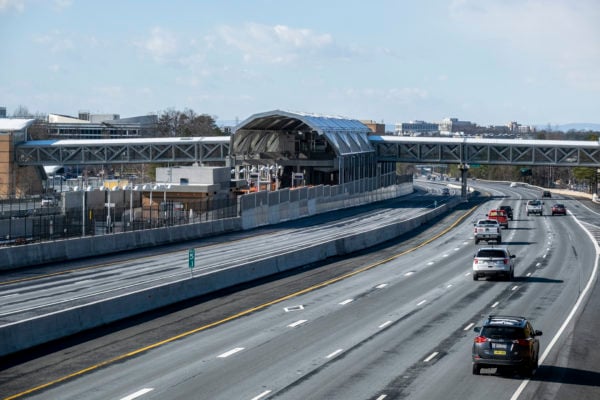
If Metro’s board of directors adopts the proposed Fiscal Year 2022 approved by its finance and capital committee yesterday (Thursday), the start of service on the second phase of the Silver Line will officially be delayed until next year.
The $4.7 billion operating and capital budget moves the start date for Silver Line Phase 2 from July 1, 2021 — as stated in the FY 2021 operating budget — to January 2022 at the earliest, citing the Metropolitan Washington Airport Authority’s expectation that it will be ready to hand over the project to Metro by Labor Day.
The budget also defers an additional $43.1 million subsidy contribution to the project until FY 2023, though $20 million will still be included in FY 2022 “to mitigate Silver Line Phase 2 service equity impacts,” according to the budget summary.
“We are preparing to welcome back customers as part of a return to normalcy, and welcome new customers who have long awaited the convenience of the Silver Line and new stations serving their communities and workplaces,” Metro General Manager and CEO Paul J. Wiedefeld said. “I am especially looking forward to beginning rail service to Dulles Airport as people resume travel to and from the nation’s capital as one of the great destinations in this country.”
Metro and MWAA officials stated as recently as January that construction on the second phase of the Silver Line, which will extend the transit system from Reston into Loudoun County, would be finished this spring, putting it on track to potentially start service in the fall of 2021.
However, the project continues to be plagued by construction issues that need to be resolved before the Metropolitan Washington Area Transit Authority will take over and begin testing.
In addition to delaying funding for the Silver Line, the proposed budget keeps rail and bus service at their current service levels, which are, respectively, at 80 and 85% of their pre-pandemic service levels.
Significant service and personnel cuts that were previously on the table have been averted, thanks to the infusion of $722.9 million in federal COVID-19 relief funds. That includes $193.4 million from the American Rescue Plan Act (ARPA) enacted by Congress in March.
“The impact of the pandemic on ridership and revenue forced us to consider drastic cuts that would have been necessary absent federal relief funding,” Metro Board Chair Paul Smedberg said. “Thankfully, the American Rescue Plan Act has provided a lifeline for Metro to serve customers and support the region’s economic recovery.”
Hunter Mill District Supervisor Walter Alcorn expressed relief that the federal relief funds will save Metro from making the proposed cuts, which could have included the closure of 19 existing rail stations and three unopened ones on the Silver Line.
“While the WMATA board is working to finalize the FY2022 budget, the Silver Line Phase 2 will now open whenever it is ready and because of the federal funds all Metrorail stations will stay open,” Alcorn said in a statement to Reston Now.
WMATA says it received more than 22,400 responses during the public comment period on the FY 2022 budget, which lasted from Feb. 20 to March 16. That is the most comments the transit agency has gotten on a budget proposal in the past 10 years.
WMATA’s board of directors is scheduled to give final approval to the proposed FY 2022 budget on April 22. The fiscal year will begin on July 1 and last until June 30, 2022.
Fire Watch In Effect — A fire weather watch is in effect today from noon to 5 p.m. The National Weather Service notes that breezy winds, low humidity and dry conditions can cause fires to spread rapidly. [Ready Fairfax]
County 9-1-1 Service Officially Restored — The county’s 9-1-1 line is running smoothly again. Most of the day on Wednesday, call capacity was limited and callers experienced longer wait times. [Fairfax County Government]
The Top Ten Percent — Ten percent of Virginians are officially fully vaccinated and more than two million doses have been administered throughout the state, according to state data. Older adults have the most vaccine doses among age groups. [Reston Patch]
Metro Dodges Service Cuts — The passage of the American Recovery Plan will help Metro avert major service cuts and layoffs. However, the direct impact of the passage of the federal relief package is still unclear. Metro’s Board of Directors chairman notes that it is not yet known how much Metro will receive. [Washington Metropolitan Area Transit Authority]
Photo via vantagehill/Flickr
Silver Line Extension Could Open Early Next Year — Phase two of the Silver Line is expected to open in early 2022, according to Metro’s general manager. The announcement comes after the Metropolitan Washington Airports Authority said it will be ready to turn the project over to Metro by Labor Day weekend. [WJLA]
County Hires Health Care Support — The county is hiring substitute and relief counselors as part of its efforts to combat the COVID-19 pandemic and administer vaccines. [Fairfax County Government]
More Solar Panels Coming to County Schools — The Fairfax County School Board voted to install solar panels on a number of school buildings in order to limit greenhouse gas emissions and improve efficiency. The school system plans to begin the project at three schools and eventually phase out to 87 sites. [Fairfax County Public Schools]
Public Hearings on Metro Budget Begin — A number of budget hearings begins this week. Metro is facing a major budget shortfall due to a dip in ridership. [Washington Metropolitan Area Transit Authority]
Northam Reflects on One Year of COVID-19 — Families, friends and neighbors are mourning the more than 9,000 Virginians who died in the coronavirus pandemic over the past year, Gov. Ralph Northam said Sunday in a video. Many others have lost jobs, income, a sense of security and knowing what would happen next as lockdowns and the virus turned life upside down. [Reston Patch]
Photo via vantagehill/Flickr
Updated at 4:30 pm — By Labor Day weekend, the Metropolitan Washington Airports Authority will be ready to handoff the second phase of the Silver Line project to the Washington Metropolitan Area Transit Authority.
Today’s announcement comes after nearly a year of delays for the project, which adds new stations from Reston to Loudoun County. Major construction issues, including the quality of concrete panels, caused significant concerns in recent months.
But now Charles Stark, senior Vice President of the Dulles Corridor Metrorail Project, said major progress has been made.
“Recent progress on outstanding issues has put us in a position to establish a target date for substantial completion and will enable Metro to solidify its plans for final testing, training and starting passenger service.” Stark wrote in a statement.
But a spokeswoman for Metro cautioned that Merro will ultimately determine if it will accept the project.
“Today’s announcement enables Metro to begin planning and budgeting for the start of service in early 2022. As MWAA achieves substantial completion, Metro will be testing, conducting system safety certification, and recruiting and training employees to get ready for passenger service,” wrote Metro General Manager/CEO Paul J. Wiedefeld
The project is currently being managed by the Metropolitan Washington Airports Authority. Phase two extends the line to Loudoun County and includes six new stations and a rail maintenance facility.
This comes as Metro considers closing down three of the newly-opened stations early next year due to drastic budget cuts and dips in ridership.
Wind Advisory In Effect — The National Weather Service has issued a wind advisory that will be in effect from 2-6 p.m. today. [NWS]
Metro Seeks Comment on Proposed Budget — Metro is seeking the public’s feedback on its budget, which faces a significant shortfall due to a decrease in ridership caused by the pandemic. Ridership is down about 90 percent on Metrorail. [Washington Metropolitan Area Transit Authority]
Reston Association Committee to Host First Public Forum — The organization’s multimodal transportation advisory committee is hosting its first public forum of this year on March 11. The committee seeks input on sidewalks, trails, pathways, crosswalks, and the overall pedestrian experience in Reston. [RA]
Death Penalty Repeal Sent to State Governor — Virginia could become the first state in the South to end the death penalty. The legislation was passed on Monday by state lawmakers and now heads to the desk of Gov. Ralph Northam. Virginia has executed more people in its history than any other state. [Reston Patch]
Photo via vantagehill/Flickr
Metrorail is now operating at the same frequency during peak and off-peak hours on weekdays after budget changes prompted by the impact of the COVID-19 pandemic took effect yesterday (Monday).
Under the revised Fiscal Year 2021 budget, trains are running every 12 minutes on the Orange, Silver, Blue, Green, and Yellow lines, while Red line trains operate every six minutes. Service after 7 p.m. and on weekends has not been altered.
The reduction of rail service during weekday rush hours was recommended as part of a revised FY 2021 budget that the Washington Metropolitan Area Transit Authority Board of Directors approved when it met on Nov. 19.
“The changes bring rail service in line with ridership demand while managing costs amid pandemic-related budget constraints,” WMATA said in a news release. “Rail ridership remains down nearly 90 percent from pre-pandemic levels.”
In contrast, WMATA says Metrobus ridership is only down 55% on weekdays and less on weekends compared to pre-pandemic levels, so service will expand to accommodate additional capacity starting on Mar. 14.
“Customers will see more buses, more often on the 125 lines of service currently operating, and more routes will be added to expand bus service on weekends,” WMATA said.
More details about the March Metrobus service changes will be provided at a later date, the transit agency says.
Photo by Chuck Samuelson/Dulles Corridor Metrorail Project
As we look forward toward closing the book on 2020 and ring in 2021, there are a few noteworthy closures around the county to be aware of.
Services and government offices throughout Fairfax County have altered their schedules in observance of the New Year’s holiday.
The full list from around the county is as follows:
Fairfax County Government:
- County government offices will be closed on Jan. 1.
Fairfax County Courts:
- The Fairfax Circuit, General District, and Juvenile and Domestic Relations District courts will be closed all day on Dec. 31 and Jan. 1.
Reston Association:
- Reston Association offices, including the Central Services Facility and Nature House, will be closed Dec. 31 and Jan. 1 in observance of the New Year holiday.
- RCC Hunters Woods is open from 9 a.m. to 5 p.m. on Dec. 31, and from noon to 5 p.m. on Jan. 1.
- RCC Lake Anne is open from 9 a.m. to 5 p.m. on Dec. 31, and it is closed on Jan. 1.
Public Schools:
- Fairfax County Public Schools remain closed through Jan. 1 for Winter Break. All students will resume classes virtually on Tuesday, Jan. 5. Monday, Jan. 4, is an independent day.
County Libraries, Recreation Centers:
- All Fairfax County library branches, community and regional, will be open from 10 a.m. to 5 p.m. on Dec. 31. They will all be closed on Jan. 1.
- All Fairfax County RECenters, except George Washington RECenter (GWRC), will be open at their regular times and close at 4 p.m. on Dec. 31. GWRC will be closed on Dec. 31. All RECenters will be closed on Jan. 1.
Town of Herndon government and services:
- Government offices will be closed on Jan. 1.
- The Herndon Community Center will be open from 7 a.m. to 4 p.m. on Dec. 31, but it will be closed on Jan. 1.
- The Town of Herndon will not provide trash collection on Jan. 1. Trash that is normally collected on Friday will be picked up Thursday, Dec. 31.
Public Transit:
- Connector buses will operate on a Sunday service plan on Jan. 1. Check here for operating routes.
- Fairfax CUE service will not be provided on Jan. 1.
- WMATA Metrorail service will open at 5 a.m. and close at 11 p.m. through Dec. 31. Service will open at 8 a.m. and close at 11 p.m. while operating on a holiday schedule with Sunday service intervals on Jan. 1.
- WMATA Metrobus will operate on a regular schedule on Dec. 31 and will go to a Sunday schedule for Jan. 1.
- Metro’s customer information call center will be closed. Automated information is available by calling 202-637-7000 or online at wmata.com
- WMATA’s regular fares and parking fees will be in effect on Dec. 31. Off-peak fares will be in effect all day, while parking will be free at all Metro-operated facilities on Jan. 1.
County Trash and Recycling:
- There will be no change in the county’s trash and recycling collection on Jan. 1. To ensure all trash and recycling is collected, the county urges for all materials to be placed at the curb or street line by 6 a.m.
- County Public Works and Environmental Services administrative offices will closed on Jan. 1 and reopen on Jan. 4.
- The recycling and disposal centers at the I-66 Transfer Station and I-95 Landfill Complex will be closed at 2 p.m. on Dec. 31 and all day on Jan. 1.
Photo by Elisha Terada/Unsplash
Metro will start collecting fares from bus riders again on Jan. 3 as part of its pandemic recovery plan, the Washington Metropolitan Area Transit Authority announced yesterday (Thursday).
The WMATA board of directors authorized a temporary suspension of Metrobus fare collections in March as part of a policy prompted by the COVID-19 pandemic that required riders to board buses through the rear doors in an effort to reduce contact between passengers and drivers.
With fare collections resuming, bus riders should return to entering the vehicles from the front, where the farebox and SmarTrip equipment are located.
WMATA says the change in policy is enabled by the more robust public health procedures that it has put in place now that there is a better understanding of how the novel coronavirus is transmitted.
“With everyone wearing masks, shields for operators on every bus, and enhanced daily cleanings, front-door boarding is safe, expands our capacity for more riders, and helps us resume some normalcy,” Metro General Manager and CEO Paul Wiedefeld said. “We also need to collect fares from every rider to keep essential Metro transit employees working and continue to provide essential service.”
Metrobus costs $2 per trip, which is payable in cash or with a SmarTrip card. Metro also offers a seven-day bus pass for $15 that provides unlimited access to Metrobus and other local bus services, including the Fairfax Connector.
The plan to resume collecting bus fare comes as Metro threatens to make significant service cuts after plummeting ridership during the pandemic contributed to a projected deficit of nearly $500 million for Fiscal Year 2022.
The dilemma facing Metro is shared by other major transit systems around the country, leading local elected leaders and transportation officials to call for the inclusion of public transit funding in a federal coronavirus relief package currently under negotiation in Congress.
Without outside support, WMATA could close 19 stations, drastically reduce rail and bus service hours and routes, and eliminate 2,400 additional jobs. The impact of those cuts is expected to land hardest on low-income residents and other populations that depend on transit.
Metro’s proposed FY 2022 budget will be up for public comment early next year.
The timeline for completion of the second phase of the Silver Line continues to be the subject of uncertainty.
Phase II of the Silver Line has the potential to open in the fall of 2021, at the earliest. That is subject to change, however, as there are multiple issues that must be resolved first.
Laura Mason, head of capital delivery for Metro, discussed 28 issues with Phase II of the Silver Line project during Metro’s Safety and Operations Committee meeting on Dec. 10. She detailed the status of 14 quality issues previously brought forth, as well as 14 unresolved issues.
Of the 28 total issues discussed during the meeting, 10 are unresolved, eight are underway where a tentative agreement exists and resolution is in progress, and 10 are resolved. Metro will require the resolution of the issues by the Metropolitan Washington Airports Authority (MWAA) and its contractors before accepting the project.
When MWAA reaches a substantial completion date (SSCD) after resolving issues to an acceptable level by Metro, Metro will conduct 150 days of operational readiness testing and pre-revenue activities before the potential start of service. MWAA currently projects a SSCD of April 1, 2021.
“Based on an April substantial completion, that would yield a tentative forecast of a start of service in the fall of 2021,” Mason said.
“However, we maintain that Metro will not set a date until all identified issues have been resolved to meet our acceptance and we have a clear path to an acceptance of the project.”
She clarified that MWAA’s response to the unresolved issues will determine the path forward and the timing of the ultimate acceptance or rejection of the project.
The 14 new issues presented at the meeting consist of four categories: component failures, stations and systems, yard buildings and other open issues with resolutions already underway.
“Individually, each of these issues is not on critical path. However, taken together, they represent concerns to the acceptability of the project,” Mason said.
The issues with the yard buildings involve safe occupancy and correcting problems to ensure Metro’s ability to use the facilities to maintain its fleet of rail vehicles once the line goes into service.
The component failures brought forth detail a collection of components that require replacement even before the system has opened for operations. Mason cited concerns “about the durability of the project” when discussing the component failures.
For example, the contractor has replaced more than 1,500 insulators that were exhibiting cracks as of April 2020. Several thousand damaged track fasteners have also required replacement.
Mason said the damage to the direct fixation track fasteners is one of the biggest areas of concern. The fasteners, which are used to hold the rail in place at the appropriate height and angle, typically have a lifespan of 20 to 30 years. She did label the issue as underway after conversations with MWAA and its contractor.
Two other primary concerns she listed are the installation of the station platform pavers and deficiencies of cross bond spacing.
The station platform paver installation was initially identified as an issue after Phase I and brought to MWAA’s attention in late 2017. Issues with the installation consisted of systemic joint failures at pavers, water penetrating setting bed, and significant efflorescence deposits at the platform edges.
The installation problem is considered a maintenance issue, not a structural issue, for the platform.
The cross bonds spacing issue exists in 20 locations that Metro identified as deviating from design criteria and industry practice. It is regarded as a high-risk item, but a resolution to address the issue is already underway.
“There are and will continue to be other issues that come up, and we will try first to resolve them at the project level,” Mason said.
“We’ve also implemented bi-weekly executive coordination meetings for technical review between myself, my counterpart at the Airports Authority and executives from the contractor teams.”
The project has faced a number of issues that have delayed its completion. More than 11% of the concrete panels at five of the six new stations on the extension were discovered to have cracks that needed to be repaired.
Issues with concrete and leveling were also found in September 2019, while defective concrete rail ties delayed progress in March 2019.
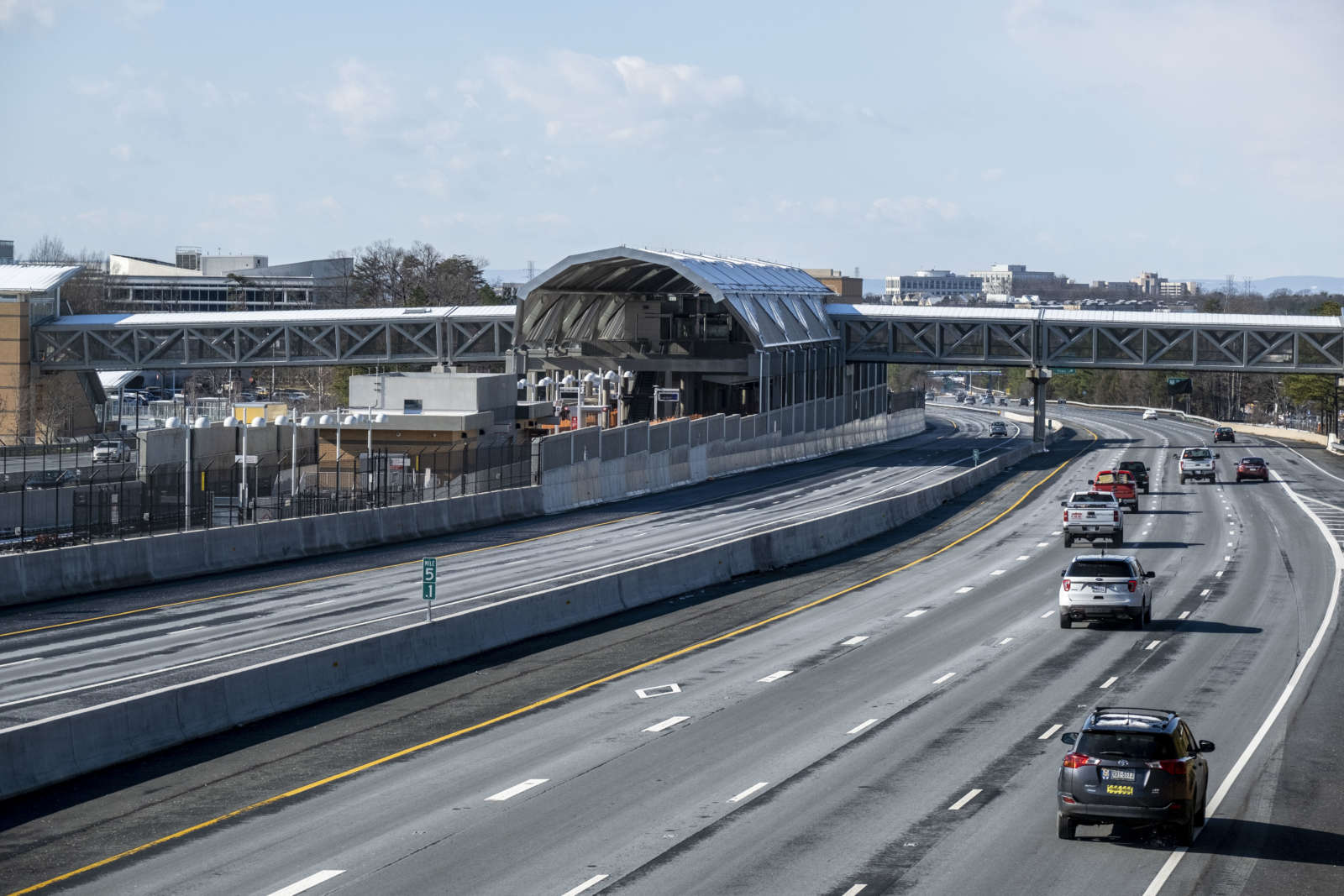
Metro is considering plans to eliminate weekend service as the system grapples with how to fill a nearly $500 million deficit.
The proposal, which the Washington Metropolitan Area Transit Authority board will hear on Friday, would also call for trains to run every half hour, shutter 19 stations and slash bus service levels.
According to the proposal, Metro would offer an “affordable bare-bones service network to sustain essential travel and support the region’s recovery.” Under the proposal, ridership would be reduced to around 45 percent of pre-pandemic levels. The system would also close at 9 p.m.
“We’re facing. obviously, a historic budget crisis. It started in (fiscal year) 21 and will continue in (fiscal year) 22,” Metro General Manager Paul Wiedefeld said.
But a federal coronavirus relief package that could include funding for public transit could change the otherwise grim outlook of the overall system. According to the American Public Transit Association, public transit needs $32 billion just to survive.
Metro was awarded $800 million from the CARES Act in May — funding that runs out early next year.
Nineteen stations with low ridership would close during the pandemic. Reopening would be determined based on the financial health of Metro. Weekday rail services would end two hours early at 9 p.m. Weekend service would be eliminated entirely and bus service would be slashed from 60 to 41 routes.
The proposal also calls on cutting 2,400 jobs in addition to workforce cuts already enacted this year.
The opening of additional Silver Line stations into Loudoun County will not be affected by the budget slashes, according to the presentation.
Metro’s fiscal year begins in July. Public hearings and outreach campaigns are planned until March.
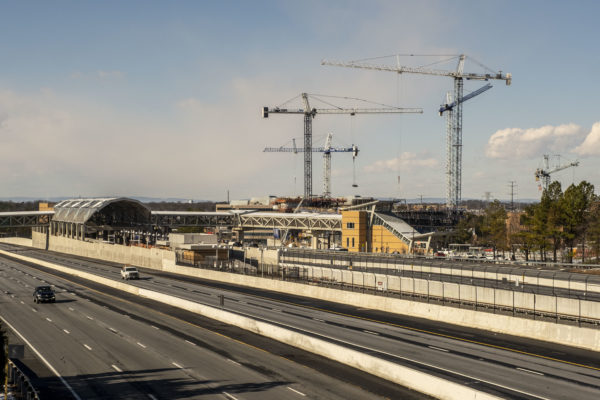
More than 11 percent of concrete panels at five of the six new stations on the Silver Line’s extension have cracks that need to b fixed, according to a new report by the Metro Office of Inspector General (OIG).
The report lays out nine conditional steps before the Washington Metropolitan Area Transit Authority can assume ownership of the project and let trains run.
Metro plans to open the extension in July 2021. The OIG audit was initiated at the beginning of the year after a whistleblower complaint in 2016 brought to light Universal Concrete Products’ failure to perform quality control checks. The concrete supplier gave Capital Rail Constructors, the company building the project, deficient concrete panels.
The report found that the Herndon Metro Station has the highest percentage of cracks — 14 percent — while the Reston Town Center Metro Station has a little over 10 percent of cracked concrete panels.
“These panels must be repaired prior to acceptance by WMATA,” states the Metro OIG in its report.
A sealant to repair the concrete panels could be applied every five to seven years in order to proceed with the project.
But the OIG report says that WMATA should not accept this solution “or any other measures short of complete replacement.”
The OIG laid out nine conditions the WMATA board should consider before taking on the project.



